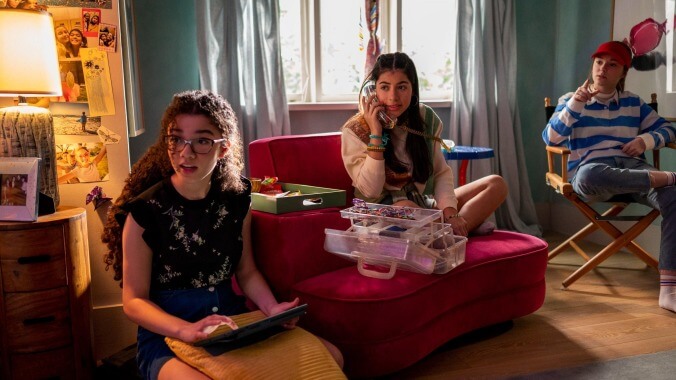The Baby-Sitters Club Photo: KAILEY SCHWERMAN/NETFLIX
TV shows die all the time—especially at Netflix, which has, quite swiftly, lost its old reputation as the farm upstate where six-season series idly wile away their senior years, in favor of an image as the slaughterhouse where two-season critical darlings go to die.
Even so, it was a little surprising when the streamer announced that it was killing off The Baby-Sitters Club, its well-received TV adaptation of the long-running Ann M. Martin book series, last week. By all accounts, Baby-Sitters was a hit, both in terms of critical reception and Netflix’s (often nebulous) internal viewing numbers. Series creator Rachel Shukert tried to put a positive face on the news at the time, but plenty of fans were upset that one of the few really good streaming shows servicing girls in that age demographic had abruptly gotten the boot.
Now, Shukert has given a candor-heavy interview with Vulture, trying to work out which particular algorithmic spasms led to her show’s death. Among other things, she posits a theory that Netflix’s cancellation decisions are driven almost entirely by subscriber growth. And, as we’ve noted before—including when talking about the service’s recent price hikes—subscriber growth for Netflix in North America has become basically nil, on account of pretty much everyone who was going to subscribe already having it.
Or, as Shukert puts it:
The truth is that when your show does very well in North America, as ours does, as far as Netflix is concerned, pretty much everybody who’s going to have Netflix [in North America] has it. They’re looking to drive subscriber growth in other parts of the world where this IP doesn’t have much recognition.
Shukert also noted that Netflix is still committed to the binge TV model as a metric for success—because is a show even anything, if viewers aren’t consuming 8 hours of it in its first weekend of release? YA fare tends to be consumed more slowly, though, at least in part because parents don’t always love it when their kids consume twice their body weight in even good and age-appropriate TV.
But Shukert also notes that Netflix’s expectations for success appear to simply be all over the map, and at least somewhat disconnected from quality:
For this show that has a fine viewership but is not a monster hit, but it’s beloved by fans … does that matter? I don’t know. I think we had the bad luck to come out at about the same time as Squid Game, which showed them how crazy numbers could get. Numbers that were totally respectable and successful last year were suddenly seen in a different way. I don’t have access to a lot of this data, and in general creators don’t have access to this data at Netflix, so it’s what you put together on your own.
Shukert—who’s not unfamiliar with Netflix’s mercurial attitudes toward its own content after her time on GLOW—noted that, despite hopes, she isn’t terribly optimistic for a third season of series elsewhere. She expressed her sadness, among other things, at breaking up the teamwork between her young stars, and at the loss of a show that seemed to speak to girls in a way so much of pop culture is already targeted at boys:
I think female audiences are trained to not take their own stories as seriously. Stuff men were obsessed with when they were 9 is treated like Hamlet. How many Spider-Man movies are there? How many Star Wars? They tell it over and over again from different perspectives. That’s all fine, obviously. But what if someone treated something for girls that seriously? Even with a fraction of the money.

